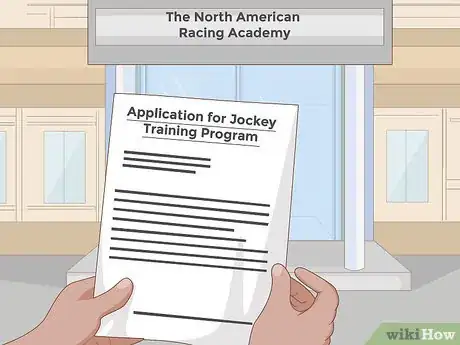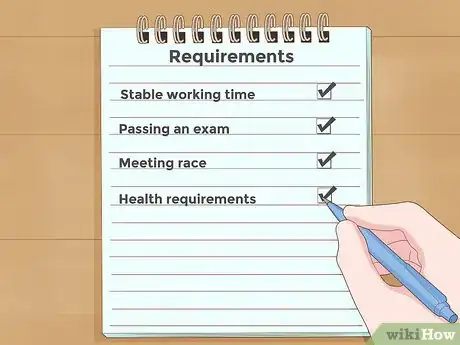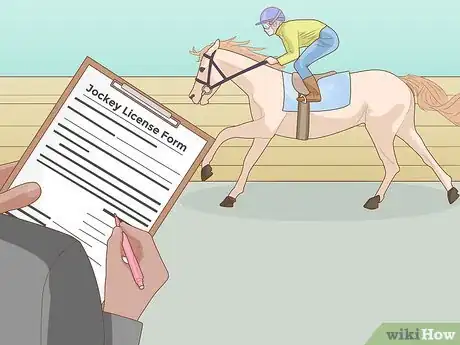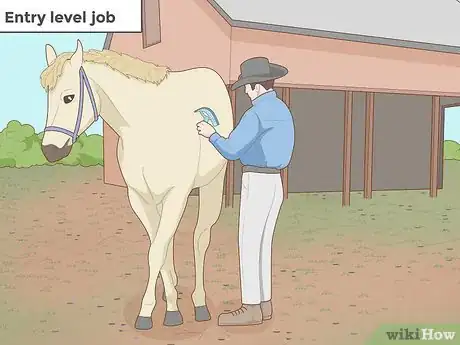This article was co-authored by wikiHow Staff. Our trained team of editors and researchers validate articles for accuracy and comprehensiveness. wikiHow's Content Management Team carefully monitors the work from our editorial staff to ensure that each article is backed by trusted research and meets our high quality standards.
There are 8 references cited in this article, which can be found at the bottom of the page.
This article has been viewed 23,927 times.
Learn more...
Jockeys ride horses competitively, and the possibility of winning a prestigious race like the Kentucky Derby draws many horse lovers to the profession. In the United States, top jockeys can earn millions of dollars per year, but most earn between $30,000 and $40,000 annually. Because the majority of a jockey’s earnings depend on winning races, it is a risky profession that requires training, professional networking, and meeting stringent physical requirements.[1]
Steps
Acquiring Education and Training
-
1Enroll in a jockey training program. In the United States, the North American Racing Academy is the country’s only school for jockeys and offers a two-year program. Applicants need to have a high school diploma or GED and experience riding and training horses.[2]
-
2Apply for a jockey apprenticeship license. Since application requirements vary by region, it is important to research the rules in your area. In the United States, many states require applicants to be at least 16 years old and meet specific height and weight requirements.[5]Advertisement
-
3Fulfill apprenticeship requirements. These vary by region, so make sure you are familiar with the requirements in your area. They may include spending a certain amount of time working in stables, passing an exam, and meeting racing and health requirements.[6]
-
4Apply for a jockey license. Requirements vary by region and could include demonstrating your riding skills and knowledge of racetrack rules to racetrack officials. You can apply for a jockey license at most racetracks.[7]
- A jockey who has earned his or her jockey license is called a “journeyman jockey.”[8]
Finding Work as a Jockey
-
1Take an entry level job at a race track or horse farm. This allows you to get experience with horses and start building a professional reputation. While the glamor of racing is what draws many jockeys to the profession, potential employers want jockeys who have a proven ability to work hard behind the scenes, too.[9]
-
2
-
3Hire an agent. An agent solicits business with horse owners and trainers. While it isn’t mandatory to have an agent, the vast majority of jockeys are represented by one to assist with securing work.[12]
Succeeding as a Jockey
-
1
-
2
-
3Study the races and horses. Since each race course and horse’s abilities are different, jockeys need to be knowledgeable about them in order to race effectively. After the race, jockeys often interact with trainers to give them information about the horse’s performance.[17]
-
4Join the Jockeys’ Guild. In the United States, the Jockeys’ Guild advocates for safe working conditions, bargains collectively for its members, and provides disability benefits and life insurance.[18] Members must be licensed jockeys and pay annual dues of $100 and a mount fee of $4 for each horse they ride.[19]
Community Q&A
-
QuestionIs becoming a jockey an unrealistic and unreasonable dream? What are the chances of becoming a jockey?
 Community AnswerBecoming a jockey is not an unreasonable or unrealistic dream. Many have started out as just riders, but with hard work and determination, it can become a reality. Your chances depend on just how much hard work and determination you're willing to put into this dream.
Community AnswerBecoming a jockey is not an unreasonable or unrealistic dream. Many have started out as just riders, but with hard work and determination, it can become a reality. Your chances depend on just how much hard work and determination you're willing to put into this dream.
References
- ↑ https://bizfluent.com/info-8666073-average-salary-horse-jockey.html
- ↑ https://careertrend.com/facts-7609953-jockey-height-weight-limits.html
- ↑ https://careertrend.com/facts-7609953-jockey-height-weight-limits.html
- ↑ https://horseandcountry.tv/what-does-it-take-become-a-jockey/
- ↑ https://careertrend.com/facts-7609953-jockey-height-weight-limits.html
- ↑ https://careertrend.com/facts-7609953-jockey-height-weight-limits.html
- ↑ http://careers.stateuniversity.com/pages/7854/Jockey.html
- ↑ https://careertrend.com/facts-7609953-jockey-height-weight-limits.html
- ↑ https://jobshadow.com/interview-with-a-jockey/
- ↑ http://careers.stateuniversity.com/pages/7854/Jockey.html
- ↑ https://jobshadow.com/interview-with-a-jockey/
- ↑ https://bluegrass.kctcs.edu/about/nara/about-us/faqs/being-a-jockey-faqs/index.aspx
- ↑ https://jobshadow.com/interview-with-a-jockey/
- ↑ https://bluegrass.kctcs.edu/about/nara/about-us/faqs/being-a-jockey-faqs/index.aspx
- ↑ https://bluegrass.kctcs.edu/about/nara/about-us/faqs/being-a-jockey-faqs/index.aspx
- ↑ https://jobshadow.com/interview-with-a-jockey/
- ↑ https://jobshadow.com/interview-with-a-jockey/
- ↑ https://www.jockeysguild.com/history
- ↑ https://www.jockeysguild.com/assets/files/Page_Editor_Files/membershipApplication_2014.pdf



































































